Can I Use My Electric Car to Power My House
31 Ways to Save Energy in Your Home
Small, everyday changes in your power consumption can be easy to make. They don't cost much, but they can add up to real energy savings. Here are 31 tips — one for each day of the month, plus a few bonus suggestions — for ways to save energy at home in your daily life with very little effort. Some of these ideas are obvious, some not so much, but all are simple ways to save energy that are good for the environment and could potentially help with your monthly energy bill too.
Select a section below for ways to save energy in your home
- Rethink how you use your household appliances
- Get help from Mother Nature to save energy at home
- Adapt your daily energy habits
- Adjust your device and appliance settings to save energy at home
- Consider using an energy-saving alternative
- Make small investments to achieve long-term results
- Switch to energy-efficient appliances and electronics
- Prevent leaks in your house
- Maintain your home and appliances to keep saving energy
- Prevent energy waste when you're away from home
Print out this poster to keep yourself motivated and start saving energy today!
The key to saving energy at home every day is to stay aware and motivated. Print this poster and put it up somewhere you and your family will see it. If you have little kids, they can color it as a fun way to include them and inspire them to do their part.
Simple strategies to save energy in your home
The easy way to save energy at home is to make small changes in habits and to perform some basic regular maintenance. Here's a comprehensive list of energy-saving strategies to work into your daily life — summer, winter and year-round.
Rethink how you use your household appliances
In most homes, appliances are the major drivers of energy use. These simple adjustments are great ways to save energy:
Energy-Saving Tip 1: Wash only full loads of dishes and clothes.
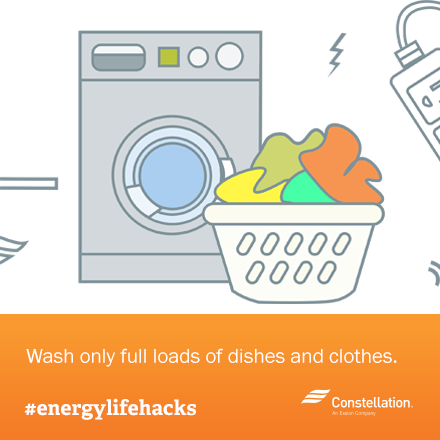
Your clothes washer and dishwasher are designed to run most efficiently with full loads. And more than that, if you run them only when full, you run them less often, which really cuts energy use.
Energy-Saving Tip 2: Wash clothes with cold water.
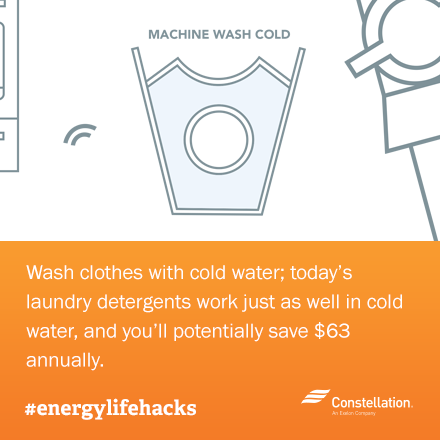
Clothes washers and laundry detergents are designed to work efficiently with cold water. If you only wash with hot water when you need to disinfect, you could save $60 or more a year.
Energy-Saving Tip 3: Keep your appliances clean.
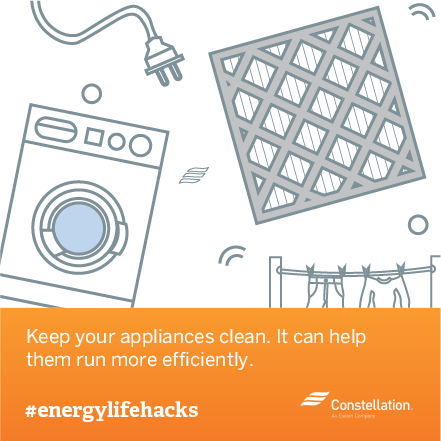
Every appliance runs more efficiently when filters are clear of dust and door seals are free of gunk.
Energy-Saving Tip 4: Keep the oven door closed while cooking.
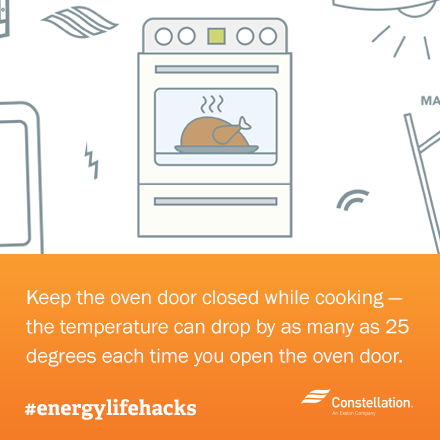
The temperature in your oven can drop 25 degrees or more every time you open the oven door.
Energy-Saving Tip 5: Don't stand in front of an open refrigerator door.
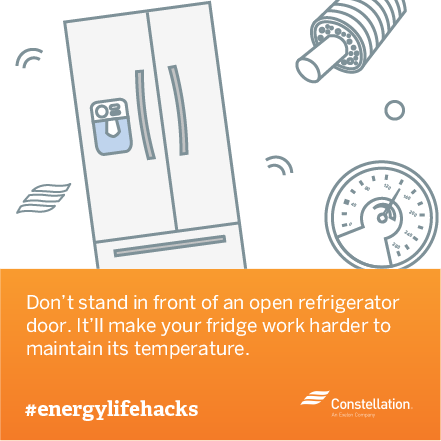
The longer the fridge door is open, the harder the appliance has to work to maintain a cool temperature. Decide what you want in advance to minimize the amount of time the fridge or freezer door is open.
BONUS TIP: Automate your appliances with smart assistants.
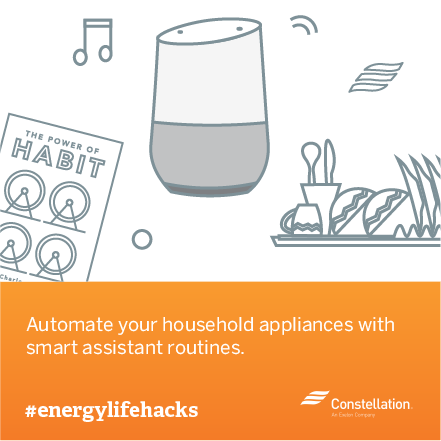
Smart assistants make it possible to control your appliances, even while away. With smart assistant routines, you can control your appliances and turn them off remotely to save time and energy.
Back to Top
Get help from Mother Nature to save energy at home
Sometimes the best way to save energy is simply not to use it at all. Here are some energy-saving tips that involve letting nature take its course:
Energy-Saving Tip 6: Air-dry clothes.
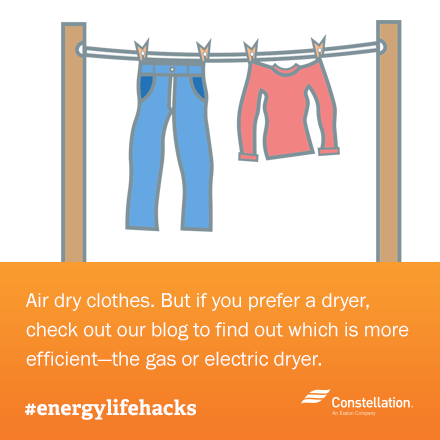
There's nothing quite like the smell of sheets, towels and clothes that have been dried out in the fresh air. Consider air-drying clothes on an old-fashioned clothes line or even hanging them inside the house. Alternatively, use an energy-efficient dryer.
Energy-Saving Tip 7: Air-dry dishes instead of using your dishwasher's drying cycle.
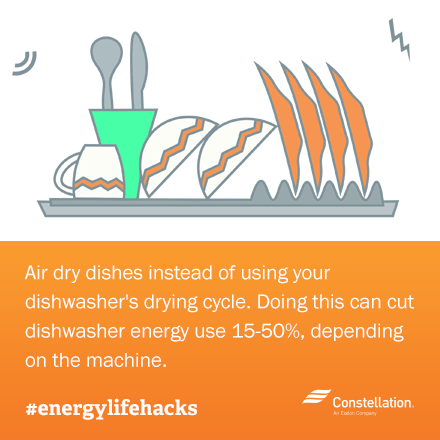
Select the air-dry option on your dishwasher. Crack it open after the rinse cycle and your dishes will dry without a single kilowatt being used. You'll also save energy by keeping your kitchen cooler.
Energy-Saving Tip 8: Open curtains facing the sun.
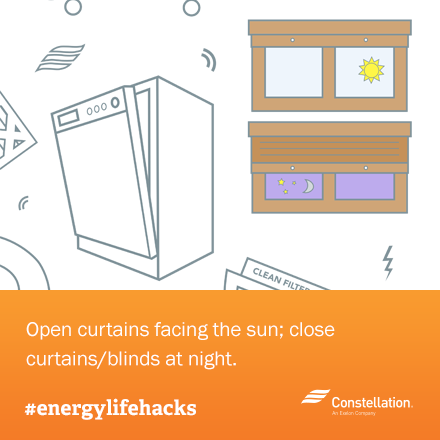
Even the most efficient windows allow energy to pass through. Sunlight beating down all day can really heat your interior. At night, close curtains and blinds to create another layer of insulation. During the day, let the light shine in during cold weather, but block it when it's hot.
BONUS TIP: Bring in more natural light with mirrors and bright walls.
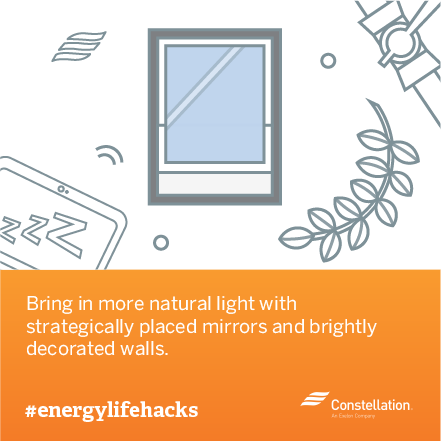
Make the most of natural light with bright decorating choices, strategically placed mirrors and putting workspaces near windows so that you don't need to keep the lights on all day.
Back to Top
Adapt your daily energy habits
Changing your habits will have a major effect on your power use. When thinking about ways to save energy at home, putting thought into the little things has a big impact.
Energy-Saving Tip 9: Switch out incandescent lights.
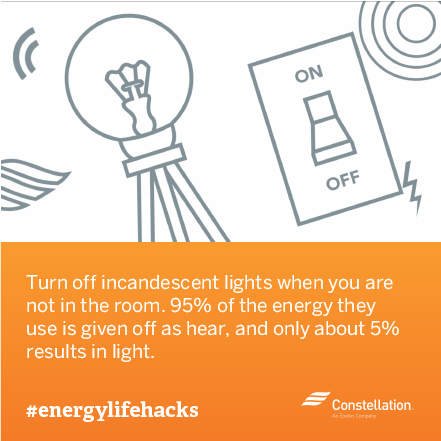
Traditional light bulbs waste 95% of the energy they use giving off heat, with only 5% going toward light. Switch them out or use them sparingly. Leaving them on for long periods is highly wasteful.
Energy-Saving Tip 10: Take shorter, cooler showers.
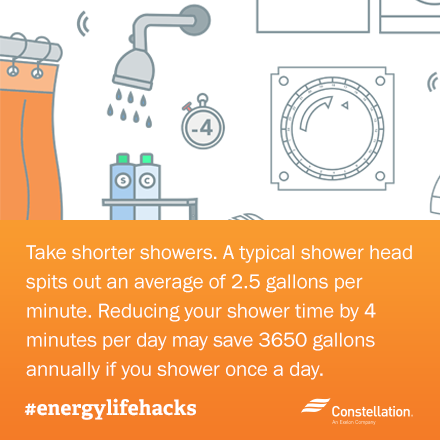
Cut the energy used by your hot water heater by taking shorter, cooler showers. Consider that a typical shower uses 2.5 gallons of hot water a minute. Cutting your daily shower by four minutes will save 3,650 gallons a year.
Energy-Saving Tip 11: Turn off electronics and appliances when they're not in use.
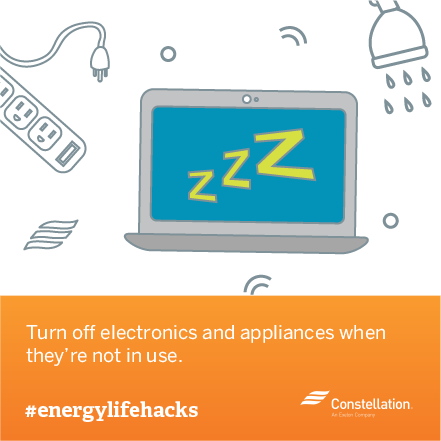
Leaving your computer on while idle wastes electricity and shortens the life of your machine. The same goes for televisions, printers and other electronics. If you see the indicator light on, you're burning power needlessly.
BONUS TIP: Unplug battery chargers when not in use.
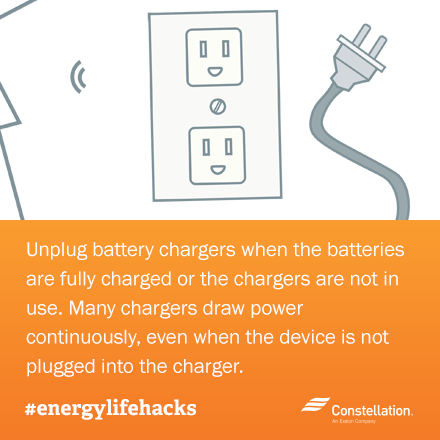
Many devices, including battery chargers, draw power continuously, even when not in use. Cut so-called vampire power consumption and save a bundle.
Back to Top
Adjust your device and appliance settings to save energy at home
If you're willing to be a little flexible with the thermostat and be aware of when and how you're using energy, you can easily reduce waste.
Energy-Saving Tip 12: Adjust your thermostat according to the time of day.
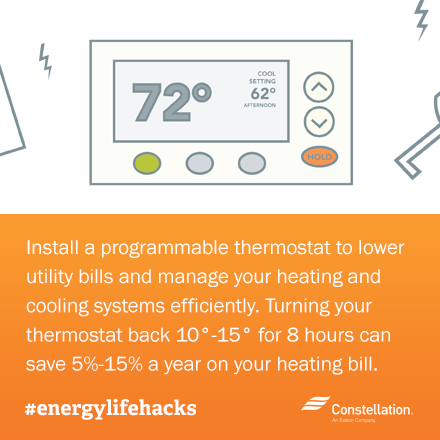
Reduce energy use at home by adjusting the thermostat day and night, as well as when you're away or at work.
Energy-Saving Tip 13: Lower the thermostat on your water heater to 120 F.
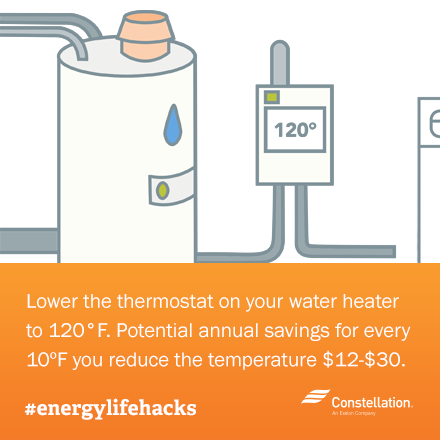
Heating water is the third-largest use of energy in most homes. Turning down the thermostat a few degrees cuts consumption without reducing comfort.
Energy-Saving Tip 14: Set your computer to sleep or hibernate mode.
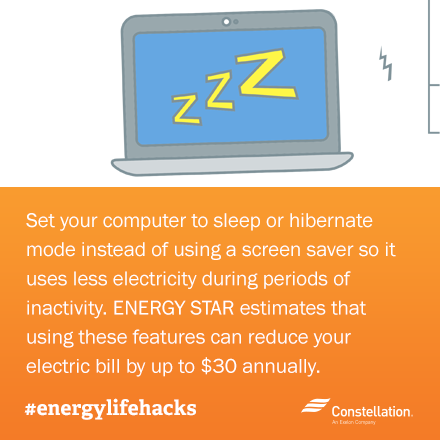 You use much less energy than by leaving your computer on with a screen saver.
You use much less energy than by leaving your computer on with a screen saver.
Energy-Saving Tip 15: Avoid using the rinse-and-hold setting on your dishwasher.
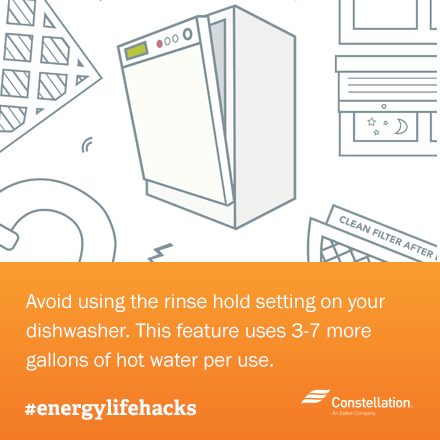
This setting uses 3 to 7 more gallons of water than a regular wash cycle.
BONUS TIP: Raise your room temperature slowly to keep your bill lower.
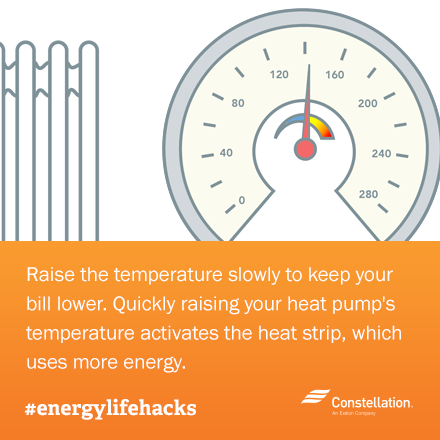
If you have a heat pump, quickly raising its temperature activates the heat strip, which uses more energy.
Back to Top
Consider using an energy-saving alternative
Get chores done without plugging something in. Think of a broom instead of a vacuum. And if you do use an appliance, right-sizing to a smaller appliance helps. A hand-held mini-vac uses less energy than your full-size upright.
Energy-Saving Tip 16: Use a microwave or toaster oven instead of your conventional oven.
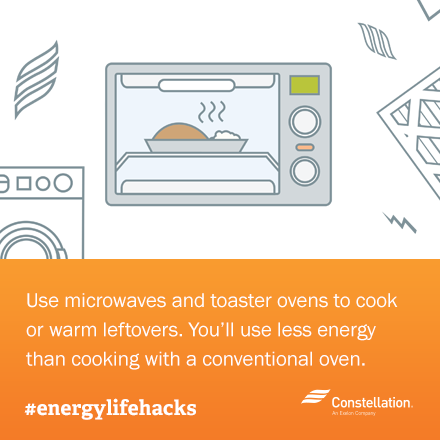
You'd be surprised how much you can cook, beyond just warming leftovers, in these energy-saving appliances.
Energy-Saving Tip 17: Use the dishwasher instead of washing by hand.
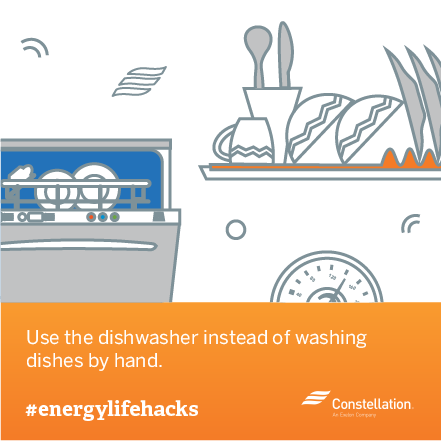
An electric dishwasher doesn't just save effort; it saves energy, using 5,000 fewer gallons of hot water per year compared to washing by hand.
BONUS TIP: Use your electric kettle to boil water instead of a microwave.
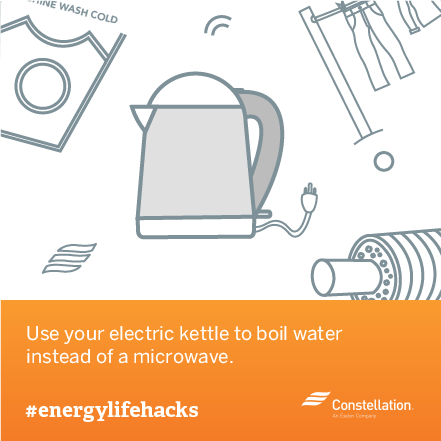
It focuses energy on efficient heating, boiling water faster with less electricity.
Back to Top
Make small investments to achieve long-term results
Here are a few things you can buy that increase the energy efficiency of your current appliances. They don't cost much money and don't require expert installation, which make them easy ways to save energy at home.
Energy-Saving Tip 18: Plug home electronics into power strips.
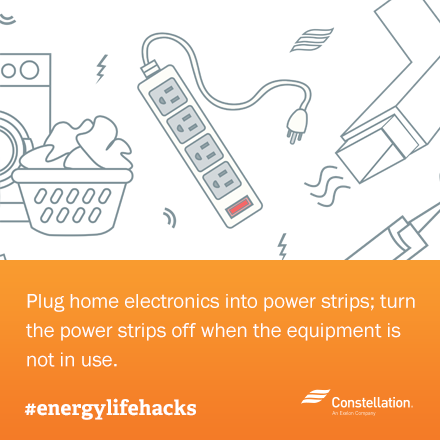
Turn the power strips off when equipment is not in use. You'll stop these devices from using energy when idle with one convenient switch.
Energy-Saving Tip 19: Install low-flow shower heads.
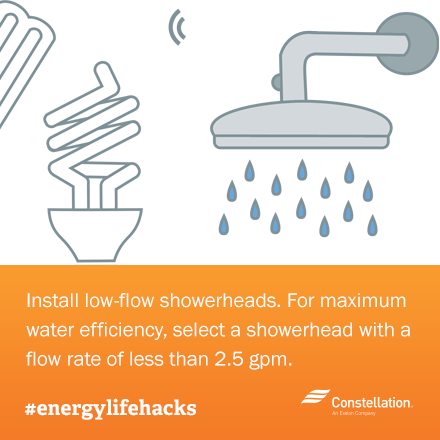
Shower heads that give good water pressure with fewer gallons per minute (under 2.5 gpm are best) will cut water and energy consumption.
Energy-Saving Tip 20: Add aerators to your faucets.
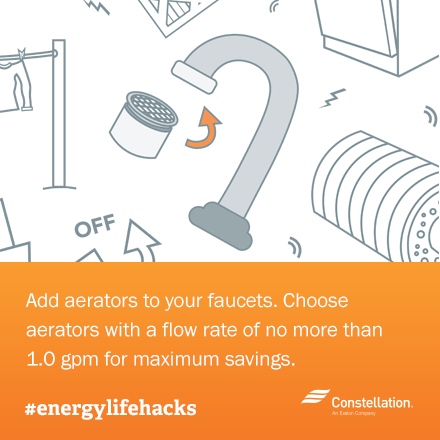
Choose aerators with a flow rate of no more than 1.0 gpm for maximum savings.
BONUS TIP: Add an insulating blanket to older water heaters.
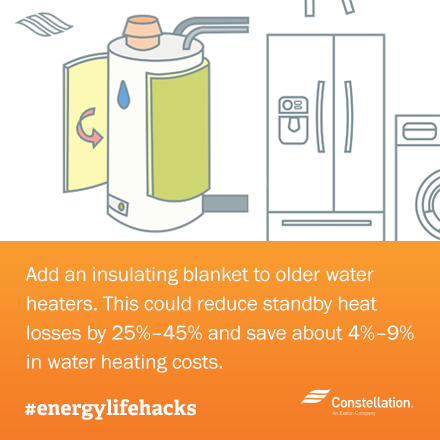
These can reduce standby heat loss by 25%–45% and save about 4%–9% in water heating costs.
Back to Top
Switch to energy-efficient appliances and electronics
Modern appliances are dramatically more efficient than they were even 10 years ago. Whether in your kitchen, your laundry room or your office, ENERGY STAR® options make it easy to compare and find what will work best and use the least electricity.
Energy-Saving Tip 21: Use ENERGY STAR-qualified CFL and LED bulbs.
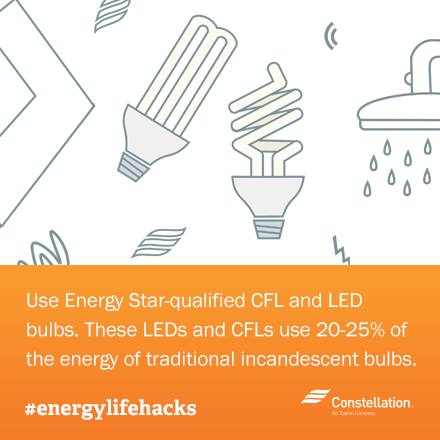
LEDs and CFLs use a fraction of the energy of traditional incandescent bulbs — and they last longer.
Energy-Saving Tip 22: Replace older home appliances with energy-efficient models.
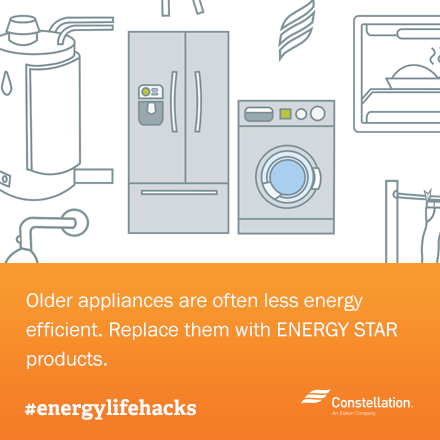
From air conditioners to coffee makers, you'll find multiple ways to save energy and money by buying new ENERGY STAR® products.
Energy-Saving Tip 23: Use energy-efficient entertainment and home office electronics.
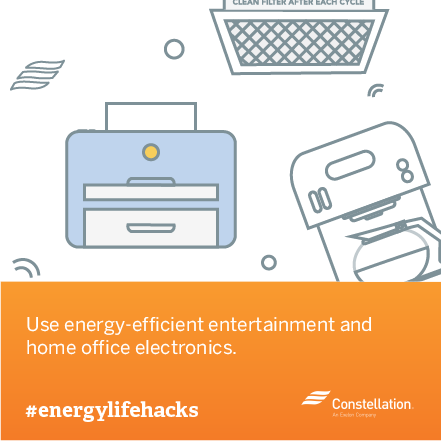
Computers, televisions, game systems and printers make big demands on home energy use as well. These also come with ENERGY STAR® ratings to help you make efficient choices.
Back to Top
Prevent leaks in your house
It isn't enough to buy energy-efficient products and use them with care. You may still be wasting energy if your home isn't well insulated. Here are the common problem areas in most homes:
Energy-Saving Tip 24: Insulate heating ducts.
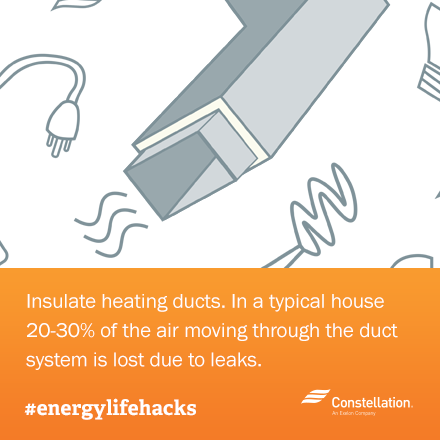
Some 20%-30% of warm or cool air in your home is lost to leaky air ducts.
Energy-Saving Tip 25: Seal air leaks.
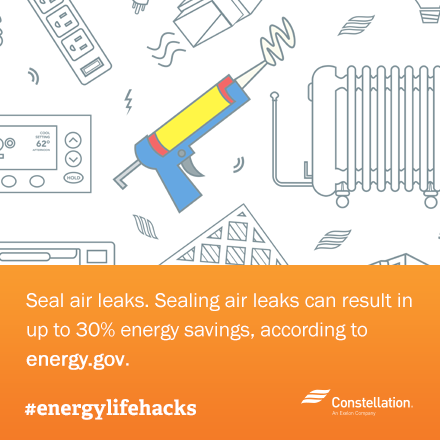
Sealing air leaks around doors, windows and gaps where gas, water and electricity come in can save between 5% and 30% of your energy use, according to Energy.gov.
Energy-Saving Tip 26: Insulate hot-water pipes.
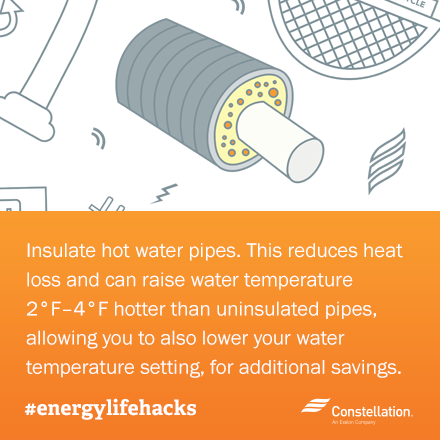
Keeping water hot while traversing pipes by adding insulation can raise its temperature at the point of use between 2 and 4 degrees Fahrenheit. You can turn down your hot water heater without sacrificing comfort.
Back to Top
Maintain your home and appliances to keep saving energy
Clean appliances and a clean home will keep everything running at optimum energy efficiency. Less dust in the air is healthier, and less gunk in your systems means they run smoothly and use less electricity.
Energy-Saving Tip 27: Clean your air ducts.
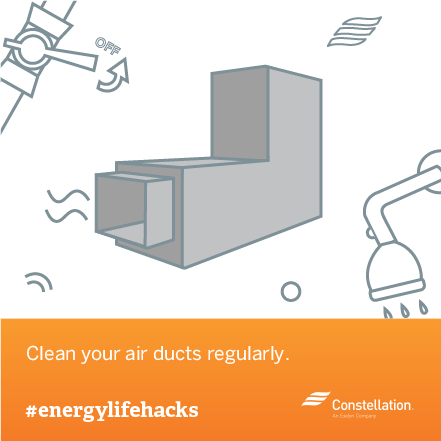
In a typical house, you can save 25%-40% on the energy your HVAC systems use by cleaning your air ducts regularly.
Energy-Saving Tip 28: Clean/replace filters in your furnace.
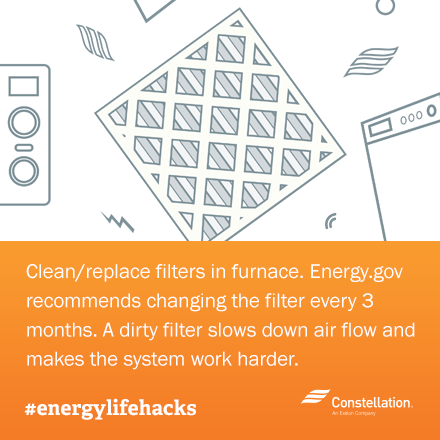
EnergyStar.gov recommends changing the air filters every three months. A dirty filter slows down airflow and makes the system work harder.
Energy-Saving Tip 29: Clean the dryer lint filter regularly to keep your dryer running efficiently.
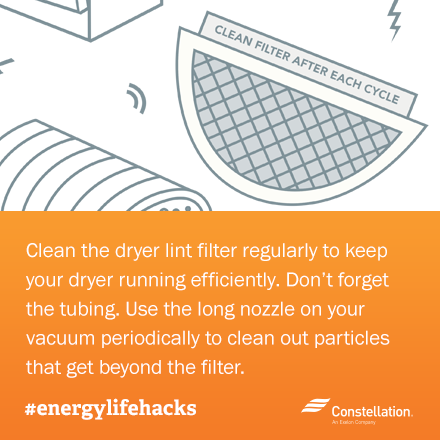
Cleaning the filter isn't enough. Use the long nozzle on your vacuum to clean the ventilation tubing.
Back to Top
Prevent energy waste when you're away from home
When you aren't living in your house for a significant length of time, you can really save energy by adjusting your systems and disconnecting all but critical appliances. Check out these energy-saving tips for when you're away from home:
Energy-Saving Tip 30: Turn off your water heater if you plan on leaving home for a few days.
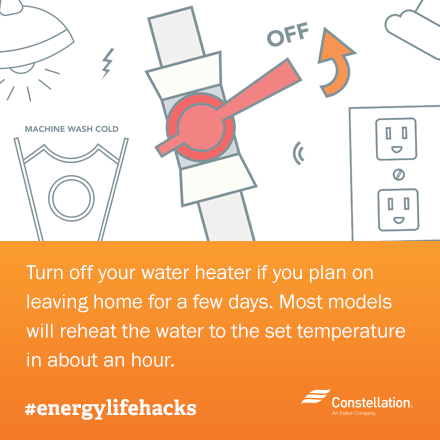
Most models will quickly reheat the water when you return home.
Energy-Saving Tip 31: Install a timer for your water heater.
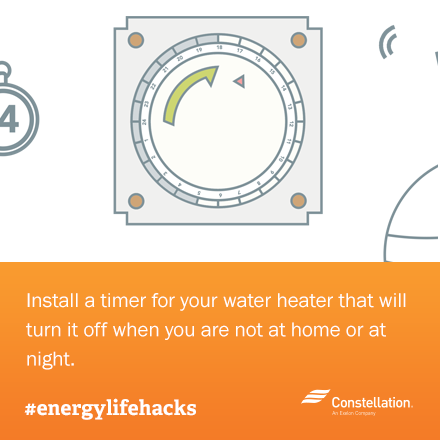
You don't have to go out of town to turn off your water heater. Timers can switch it off after your morning shower and switch it back on again just before you get home, saving the waste of it running all day.
BONUS TIP: Turn off your appliances from anywhere with smart plugs.
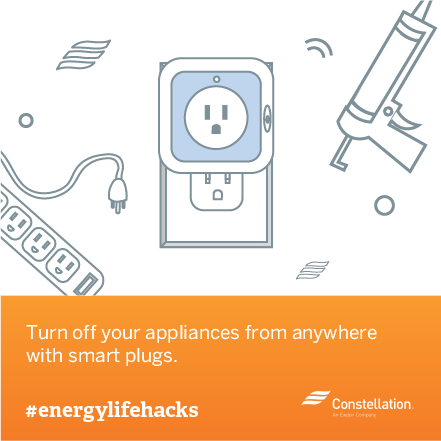
Smart plugs allow you to remotely control appliances, lights and HVAC systems in your house, switching them off when you're out and then back on when you return.
Back to Top
If you're wondering why it's important to save energy at home, the reasons are many. First of all, reducing power usage is better for the environment. You'll help keep the air cleaner and conserve resources. Being energy-efficient is also budget-efficient — saving energy saves money.
Teaching your children ways to save energy at home makes them responsible at an early age and creates lifelong responsible habits. A few easy changes can preserve a happier and healthier world for generations to come.
Can I Use My Electric Car to Power My House
Source: https://blog.constellation.com/2016/01/01/31-ways-to-save-energy-in-your-home/
0 Response to "Can I Use My Electric Car to Power My House"
Post a Comment